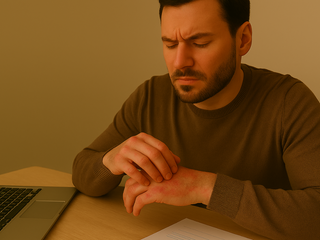Eczema can be relentless — and when it’s on your hands, it doesn’t stay quietly in the background. It makes itself known in handshakes, on keyboards, under gloves, and through every pump of hand sanitizer. The workplace, with its fast-paced routines and environmental triggers, often becomes a minefield for eczema-prone skin.
But here’s the good news: managing hand eczema at work is absolutely possible — with the right products, daily habits, and a little planning.
For those living with this chronic condition, it's not just about dryness. It’s about cracked, itchy, and sometimes bleeding skin that can make even the simplest tasks feel uncomfortable — if not painful. Whether you work at a desk, in healthcare, in hospitality, or out in the field, your hands are your most-used tools. Unfortunately, most workplaces aren’t designed with sensitive skin in mind.
At Oleum Cottage, many of our users have shared their stories — and frustrations — around managing hand eczema care while trying to stay professional, productive, and pain-free. So, we put together five common workplace scenarios where eczema tends to flare — and how to protect your hands in each one, without compromising your workday.
1. How can I protect my hands if I have to wash or sanitize them all day?
This might be your biggest trigger — but it’s one you can manage.
From doctors and chefs to teachers and hospitality staff, hand hygiene is non-negotiable. But repeated exposure to harsh soaps and alcohol-based sanitizers can strip your skin barrier, leading to irritation and flare-ups.
Protect your hands like this:
-
Use lukewarm water — hot water strips natural oils faster
-
Gently pat dry instead of rubbing with paper towels
-
Moisturize immediately after drying — always keep a small tube with you
-
Keep a sensitive skin-friendly hand cream that won’t feel sticky
-
Carry your own gentle handwash for eczema if possible — commercial soaps often contain irritants
Pro tip: Treat your hands like your face — cleanse, hydrate, and seal in moisture after every wash. And if you’re wondering about how to go about life in general, with eczema, it might be worth debunking the common myths around eczema, causes and triggers.
2. Is working at a desk bad for eczema-prone hands?
Desk jobs might seem low-impact — but they sneakily sap moisture from your skin.
Typing on warm laptops, handling endless paper, and sitting in air-conditioned rooms all day? These are silent stressors for eczema-prone hands.
Keep your hands happy with these tips:
-
Keep a lightweight, activated-oil-based moisturizer on your desk
-
Apply before meetings or breaks so it absorbs in time
-
Consider a mini humidifier to fight back against drying AC
-
If your knuckles tend to crack, try fingerless cotton gloves for paperwork — they’re skin-saving and keyboard-friendly
You don’t have to feel awkward about moisturizing mid-meeting. Choose a sleek, neutral product and make it part of your routine — like reapplying lip balm.
3. What if I have to wear gloves for long hours — would that make eczema worse?
Gloves are meant to protect — but they can also trap sweat and irritation.
If you’re a dentist, salon worker, cleaner, or lab technician, chances are you’re in gloves for hours. Latex, nitrile, and even powdered gloves can aggravate eczema with friction and moisture buildup.
Minimize damage by layering smart:
-
Wear cotton inner gloves to reduce sweat and friction
-
Choose powder-free, hypoallergenic gloves
-
Switch gloves every few hours to let skin breathe
-
Moisturize right after removing gloves — when skin is slightly damp
🧤 Think of it like layering in winter — your skin still needs that breathable buffer underneath.
4. Do you feel self-conscious about your hands in front of others?
You’re not alone — and you shouldn’t have to hide.
Whether you’re shaking hands, leading meetings, or working in customer service, visible hand eczema can feel awkward and confidence-shaking. But it shouldn’t stop you from being comfortable and professional.
Here’s how to stay confident and comfortable:
-
Don’t hesitate to say, “I have eczema” — most people will understand
-
Carry a sleek, neutral looking eczema hand cream you won’t hesitate to use
-
In cooler spaces, consider wearing sleek cotton gloves that protect and look good
-
Remember, eczema management is a form of self-care, not vanity
🌿 Managing eczema skin publicly is no different than wearing glasses — it’s not something to hide. If emotional stress or social anxiety worsens your skin, consider these small daily habits that help prevent flare-ups naturally.
5. I travel or work in the field — how do I treat eczema on my hands without access to water or sinks?
No water, no problem — it’s all about being prepared.
Field workers, delivery agents, site engineers, or anyone with a long commute often don’t have the luxury of regular hand washing or access to their usual products. But no access to a sink doesn’t mean no access to hand eczema treatment.
Build a portable eczema hand care routine:
-
Pack a travel kit: barrier cream, alcohol-free wipes, cotton gloves
-
Apply a rich, beeswax-based cream before leaving home — it locks in hydration
-
Wear gloves if you’re exposed to dust, chemicals, or sun
-
Stay hydrated throughout the day to support skin from within
🧳 If sunscreen is a daily shield for your face, barrier care should be one for your hands too.
Your hands don’t have to suffer for your job.
Managing hand eczema flare-ups at work isn’t about overhauling your entire day. It means you need a few smart, skin-supportive habits and the right products on hand.
By understanding your eczema triggers, adjusting your environment, and choosing eczema-safe skincare, you can reduce flare-ups and reclaim comfort — without compromising on professionalism or productivity.
Because at the end of the day, your hands deserve protection, comfort, and care — especially when they’re doing so much for you.


